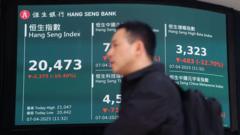Major Asian stock indexes fell sharply as fears of a global trade war intensify following recent U.S. tariffs, with experts suggesting dire consequences for exports and economic growth in the region.
Asian Markets in Turmoil Amid U.S. Tariff Shockwaves

Asian Markets in Turmoil Amid U.S. Tariff Shockwaves
The impact of U.S. tariff hikes has sent shockwaves through Asian stock markets, with analysts warning of significant economic repercussions.
Asian stock markets are facing severe declines as they grapple with the turmoil triggered by U.S. President Donald Trump’s recent tariffs. Major financial indexes from Shanghai to Tokyo and Sydney to Hong Kong plummeted upon opening on Monday, with an analyst characterizing the situation as a "bloodbath."
The direct hit comes from the fact that many Asian nations are significant manufacturers for goods sold worldwide, making them highly sensitive to the turbulent implications of a possible global trade war and its potential to thrust the world's biggest economy into recession. By midday, indicators like Japan’s Nikkei 225 had dropped by 6%, while the ASX 200 in Australia was down by 4%, and South Korea’s Kospi fell 4.7%. A belated response from investors in mainland China, Hong Kong, and Taiwan saw even steeper losses, exacerbated by their prior public holiday closures.
“The tariffs are stoking fears of rising inflation alongside the looming threat of recession,” explained Julia Lee, head of FTSE Russell, a London Stock Exchange Group subsidiary. Goldman Sachs has recently raised its estimate for the likelihood of a U.S. recession in the coming year to 45%, up from 35%, and other Wall Street firms are similarly reassessing their forecasts.
Countries like Vietnam and Bangladesh, which have grown increasingly reliant on the U.S. as a vital export market, now find themselves particularly vulnerable. New tariff rates include a staggering 46% on goods from Vietnam and 37% on exports from Bangladesh. Major brands such as Nike and Lululemon, which manufacture products in Vietnam, could see increased costs passed onto consumers.
“Asia will disproportionately bear the brunt of this turmoil as it exports more goods to the U.S. than to other markets,” stated Frank Lavin, a former Undersecretary for International Trade at the U.S. Department of Commerce.
The subsequent market downturn is not localized, as fears spread globally; U.S. markets reflected similar declines with all major indexes dropping over 5%, capping a week deemed the worst for American stocks since 2020. Meanwhile, the UK’s FTSE 100 fell nearly 5%, marking its most significant drop in five years.
With the global stock market already losing trillions since Tariff Day, it appears that the repercussions of Trump’s tariff policies will continue to unfold, placing significant strain not just on the U.S. economy but also on those of its closest global partners. Additionally, forecasters are warning that U.S. futures trading points to further tough sessions ahead on Wall Street, signaling that this chain reaction of market distress could persist.





















